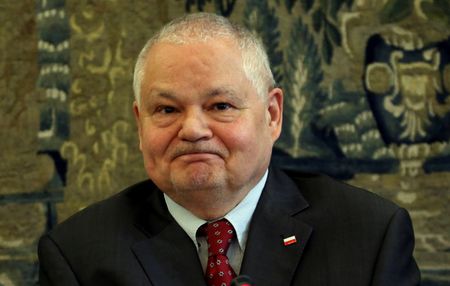WARSAW (Reuters) -Polish lawmakers tasked with investigating government accusations that central bank Governor Adam Glapinski may have broken the law aim to start hearings from witnesses this month, the head of the parliamentary committee said on Thursday.
National Bank of Poland (NBP) governor Glapinski faces accusations including that he lacked independence from the previous government, broke rules barring the central bank from financing government borrowing and misled the finance ministry about the bank’s financial results.
Glapinski, who has decades-old ties to Jaroslaw Kaczynski, head of the opposition Law and Justice (PiS) party that lost power last year, reiterated on Thursday evening his earlier rebuttal of the accusations, calling on the government and lawmakers to respect the bank’s independence.
He added that using the constitutional responsibility procedure “for ad hoc and solely political purposes” would lead to the “degradation of the institutions of the Polish state” and damage Poland’s perception abroad.
Last December, European Central Bank President Christine Lagarde told Glapinski in a letter that European Union laws offer protection to the Polish central bank governor if the incoming government planned to unlawfully prosecute or suspend him.
The parliament’s constitutional responsibility committee aims to interrogate several dozen former and current officials, including Glapinski, who began a second six-year term as central bank governor in 2022.
Zdzislaw Gawlik, head of the committee and ruling coalition party lawmaker, told reporters on Thursday the committee would next meet on Sept. 24, and planned to start hearings then.
Gawlik declined to say who would be questioned first, but said Glapinski should be one of the last to appear.
Deputy committee head Patryk Gabriel said the committee could conclude in the first half of 2025.
Unlike elsewhere in central Europe, Poland’s central bank has left interest rates unchanged this year amid an expected rebound in price growth as energy price subsidies are unwound.
Final motions to bring people in Poland’s highest offices before a State Tribunal must pass a parliamentary vote in order to proceed.
Last month, a top court ruled that lawmakers should not be allowed to question the central bank governor, saying subjecting the bank to parliamentary control would violate the bank’s independence.
Glapinski appealed for the actions “which are of purely political nature, objectively unjustified and harmful,” to be abandoned.
(Reporting by Karol Badohal; Editing by Hugh Lawson, Alexandra Hudson)











